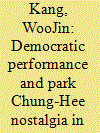|
|
|
Sort Order |
|
|
|
Items / Page
|
|
|
|
|
|
|
| Srl | Item |
| 1 |
ID:
144302


|
|
|
|
|
| Summary/Abstract |
Since China adopted the policy of reform and opening up in 1978, the Chinese media system has undergone a transformation. We survey and evaluate the media reforms. After summarizing the changes in media management, structure, and function, we discuss the challenges that China's media industries are confronting today. These include the inherent contradictions of media attributes, the administrative segmentation of the media market, and the lack of adequate protection of free speech. We conclude with recommendations for the further reform of China's media system.
|
|
|
|
|
|
|
|
|
|
|
|
|
|
|
|
| 2 |
ID:
144305


|
|
|
|
|
| Summary/Abstract |
We analyze the driving forces behind China's New Silk Road (NSR) initiative and find that they include not only short-term factors, such as the US “rebalance” of forces in Asia and China's economic slowdown since 2012 but also long-term factors such as China's ambition to recover its past glory and integrate itself still further into the global economy. We then look at the external challenges facing China's initiative, such as geopolitical competition, fear of overdependence, and political instabilities along the old silk routes. We highlight China's policy dilemmas and discuss the sustainability of China's NSR initiative and its implications for the world. Our conclusion is that China's initiative could be in for a rocky road, but if it strikes a good balance between its diplomatic objectives and means and its values and actions, the NSR could speed up regional integration.
|
|
|
|
|
|
|
|
|
|
|
|
|
|
|
|
| 3 |
ID:
144303


|
|
|
|
|
| Summary/Abstract |
Why, a quarter century after democratization, are Korean citizens so nostalgic about the former authoritarian Park Chung-hee government? What are the implications of this support for Korea's democratic deepening? To answer these questions, I offer empirical analyses of selected data from the Korea Democracy Barometer 2010 survey that confirm the relevance of two dimensions of political support to authoritarian nostalgia in Korea: the life biography model and the economic performance model at the system level. The results suggest a double-sided phenomenon: on the one hand, nostalgia based on a retrospective collective memory; on the other, citizens' critical view of the performance deficits of post-Park democratic governments in dealing with inequality in Korean society. As the findings elucidate, in spite of the challenges they face, emergent democratic governments must perform more effectively if they are to win citizens' support.
|
|
|
|
|
|
|
|
|
|
|
|
|
|
|
|
| 4 |
ID:
144304


|
|
|
|
|
| Summary/Abstract |
The rise of nationalism, unresolved territorial disputes, an intricate system of alliances, and the perceived breakdown of the balance of power have been identified as the main causes behind the outbreak of World War I. They also are strikingly similar to the challenges East Asia faces today. Will history repeat itself and see East Asia sleepwalking into another hegemonic war? China's future relations with the United States and Japan will be crucial for East Asia's regional order, but its dispute with Japan over the Senkaku/Diaoyu Islands might lead to a regional war. I argue, however, that a major war is unlikely because pre–World War I Europe and today's Northeast Asia are qualitatively different in terms of what I call multihegemony and sutured regionness.
|
|
|
|
|
|
|
|
|
|
|
|
|
|
|
|
| 5 |
ID:
144301


|
|
|
|
|
| Summary/Abstract |
Over the past two decades Korea and Japan have experienced a rapid inflow of foreign population into their homogeneous societies. Despite their many similarities in immigration control policies, Korea and Japan have differed in their politics of immigrant incorporation. Korea's central government has instituted policies that favor female marriage migrants and children of international marriages, while Japan's local governments have initiated policies for a wide range of foreign residents in their communities. I argue that the different boundaries of citizenship for specific groups of the foreign population, created and reinforced by the state, explain variations in the politics of immigrant incorporation policies in the two countries
|
|
|
|
|
|
|
|
|
|
|
|
|
|
|
|
|
|
|
|
|